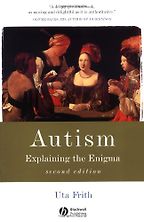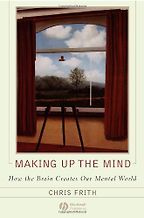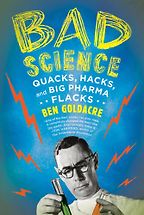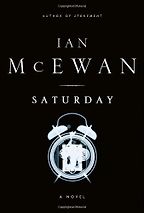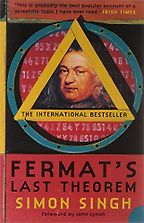Tell me about Autism: Explaining the Enigma by Uta Frith.
It’s about autism, which most people have heard of now, but which wasn’t so well known in 1989 when the book was published. Prior to Frith’s work autism was really considered a sort of emotional disorder: a lot of people used to think it was caused by parents not being warm enough (for which, by the way there is absolutely no evidence).
But nothing is purely environmental, and nothing is purely genetic – most things are a result of an interaction between the two, and it looks like this is the case for autism. One aspect of the book which revolutionised the way we think about this condition was Frith’s cognitive theories of autism. She was one of the first scientists to propose that autism is characterised by neurocognitive impairments: that is, an impairment in a circuit in the brain which allows us to perform some cognitive process.
Does she give case studies?
She does give vivid case studies, and she also describes experiments as if you’re actually in the room doing them. I read the book as a teenager and it was one of the inspirations for me to become a cognitive neuroscientist. Uta writes brilliantly about these scientific findings in a way that is easy to understand, even with no expertise in the subject, and she makes quite complicated concepts very comprehensible and fascinating to read about.
One of the things that inspired me about this book was that it illustrated that you could actually do experiments which look at these aspects of psychology that seem so abstract and unreachable: like our ability to understand other people’s minds. You can actually parse that down to its very basic components, and you can experiment to see whether children with different conditions have problems with different aspects of some high-level cognitive capacity like ‘Theory of Mind’, which she concentrates on. ‘Theory of Mind’ is our ability to attribute mental states like intentions and beliefs and desires to other people. We do it all the time: we constantly read other people’s behaviours and actions in terms of their underlying mental states and emotions. For example, if I grasp a glass of water you don’t have to ask me why; you automatically infer things, like my intention, which is to drink water from the glass, or my belief that there’s drinkable water in the glass. Frith’s idea was that perhaps this cognitive process of theory of mind is impaired in autism, and she published the first paper showing this in 1985. What comes across in the book is her absolute fascination for autism, and the different ways of investigating its causes. Even though the term ‘autism’ was only coined in the mid-1940s, she’s really interested in historical descriptions of children who seem to have had autism, like the 19th-century foundling Kaspar Hauser. One whole chapter in this book is about the lessons from history that can teach us about autism.
Tell me about your next book.
It’s by Chris Frith, Uta Frith’s husband, and it’s about consciousness, and how we are conscious, and how our brains enable us to be conscious, and to have awareness of the world around us. The point he makes is that, in fact, our conscious perception of the world is very different from what the world is actually like. Some parts of the brain process everything in our environment, but we’re not conscious of that; if we were, we would be completely overloaded with information. His main thesis in this book is that our brain creates an impression of a coherent world that makes sense, that we’re in control of. There are some nice examples from neuroscience showing that. For example, the studies by Libet from the 1980s in which he measured electrical waves in the brain to show that it produces something called a ‘readiness potential’ – about half a second before you make a movement, the brain starts preparing the movement. But what’s really interesting is that if you get people to estimate when they had the intention to move, that intention occurs many hundreds of milliseconds after the readiness potential. In other words, what seems to happen – and this has been replicated by many different experiments – is that your brain starts to produce electrical signals which prepare the movement before you feel you have the conscious intention to move. That’s just a very nice example of how our brain is constantly making us do things, but our conscious experience is actually constructed afterwards. The idea is that our brains are just reacting to changes in the environment, and this feeling of free will is completely illusionary. That’s the most extreme argument, but the evidence from neuroscience suggests that that could be the case. Other examples in the book are things like visual illusions, which are all based on the same principle – even if you know it’s an illusion, you still perceive the illusion; your brain is constructing a story. Another example is whenever you move your eyes around, you have what’s called saccadic suppression – a ‘saccade’ is an eye movement. We know that the eye is effectively blind during the movement, but we don’t experience that blindness, because our brain fills in the gaps.
It makes something like a google cache of the scene in front of us and then draws on it?
That’s quite a nice idea because there is a cache, based on previous experience, which the brain uses to predict what should be there. So the point is that we don’t just react to the world, our brains predict it way ahead of time. The other point about Chris’s idea is, if our construction of the world – our consciousness – goes wrong, then he argues that it can lead to delusions and hallucinations. The book is a real joy to read, because his style is quite chatty and he has a quite funny dialogue between himself and a fictional professor of English who’s highly intelligent, of course, but who knows little about the science of the brain.
Your third book?
Bad Science by Ben Goldacre. It’s partly an amalgamation of his columns in The Guardian, which dissect unsubstantiated claims that the media and businesses make on the basis of pseudo-science. It’s just a brilliant book, and he’s a fearless defender of science. He’s been on the wrong end of libel actions and so on, but he’s always right about the science, and about the statistics. One part of his book that I have a particular interest in is where he deals with this phenomenon that’s known as the ‘seductive allure of neuroscience’. This is the idea that for some reason the addition of ‘neurosciency’ words, brain words, make people more convinced about a certain product or finding. There was an experiment done a couple of years ago in which they explained to volunteers various different psychological phenomena. Some explanations of these phenomena were good, some were bad – so, they might say: ‘Researchers say that this phenomenon happens because…’ And then there were identical explanations but with random ‘brain words’ inserted, like ‘Brain scans indicate that this phenomenon happens because of the frontal lobe circuitry known to be involved’. The effect was that the participants generally rated the bad explanations as less satisfactory than the good explanations, except when they had neuroscience words in: which dramatically increased the satisfactory nature of the bad explanations. What it shows is that if you add a few brain words people are more likely to be convinced by something. It explains things like the success of products like ‘Baby Einstein’ and Brain Gym – which is a mainstream educational tool that’s sold for use in schools and used by many teachers, which makes these absolutely crazy claims about how the brain works and what you can do to improve things like attention and concentration in the classroom. We are weirdly impressed by science.
Is there a way around that? Does he recommend defence mechanisms?
Not explicitly, but the only way to deal with this is to understand more about science and the scientific method. I think he would argue generally that knowledge of the scientific process is very poor in this country and that’s why people are so convinced by, for example, the MMR-autism story. It’s a real shame – this kind of an education would absolutely empower us to make the right decisions but we don’t have it.
Your next book?
Saturday by Ian McEwan. I really like Ian McEwan, and partly because he has an interest in the brain. Saturday is all about a neurosurgeon called Henry Perowne, who works at UCL. McEwan is a very good friend of the head of a neuroscience department at UCL, and he spent many months shadowing neurosurgeons at the National Hospital of Neurology and Neurosurgery in Queen Square. The story takes place on one Saturday: the Saturday of the anti-Blair, anti-Iraq war demonstration of 2004 in which millions of people took part. Perowne is walking around Bloomsbury, and gets into a tussle with some men near Tottenham Court Road. It’s not so much the event that matters, but his description of his emotions: it’s like time stands still, and he describes all these different emotions that he feels for pages and pages. Perowne is describing all of his thought processes during this day, and it’s an incredible moment-by-moment interpretation of events, and an amazing insight into the way that emotions cause you to act in the way you do, and the idea we’re in control of our actions – or are we? As one of the guys is beating him up, Perowne is looking at him and recognises that he has the early symptoms of Huntingdon’s disease, which is hereditary, with a relatively early onset – symptoms usually start to appear in the mid-30s – and which affects your motor system and cognition. Perowne starts to diagnose him, and starts to really worry the man, by describing the symptoms the man has been feeling but isn’t really aware of because they’re such early symptoms.
But the book is really a journey into the brain, and how from a physiological point of view things can go wrong in the brain, and that some of those things can be alleviated by surgery, and some can’t. And the substance of the book is about things like emotion and perception of the world, and how the brain controls behaviour. It’s really, really interesting: Ian McEwan does his research so well, and he’s such an eloquent speaker on the topic of the brain. Not having been trained in medicine or science, he is sometimes able to have insights and a perspective that if you’re a specialist in the field you can’t have.
Your final book is Fermat’s Last Theorem.
Fermat was a 17th-century French mathematician and, like all mathematicians, he came up with mathematical problems. His last, the famous one, was all about triangles. Pythagoras had worked out that if you have a triangle with sides x, y and z, the formula to work out the length of the hypotenuse is z2= x2+ y2. Many millennia later, Fermat realised that this is only true for the power of 2 – ie his theorem says that there are no solvable equations for xn + yn = zn , where n is any number greater than 2.
And this theorem couldn’t be proved.
Exactly. Many mathematicians tried to prove it, and Fermat had cheekily written a teasing note, saying that he could demonstrate the theorem, but he’s not going to because there was not enough space in the margin! The book makes maths really, really fascinating: it’s about the history of maths, and also about the Cambridge mathematician Andrew Wiles who was obsessed with Fermat’s theorem since the age of ten and spent his whole life wanting to solve it, and finally did in the 1990s. The book is great because Simon Singh has this ability to write about the driest and most complex scientific or mathematical concepts and issues, and somehow make them come alive. You feel like you’re there, and you want to solve this theory, and you’re so desperate to know the solution (which comes on the last page of the book), and you also feel a lot of empathy with Andrew Wiles and you want to join him and his story. Simon Singh is a great proponent of freedom of speech for scientific journalism, which I think is absolutely necessary if science is going to progress. There has to be a proper dialogue between the public and scientists, who have to be able to write freely about scientific findings and issues where there’s scientific evidence. It doesn’t have a lot to do with neuroscience, but I love this book.
June 15, 2010. Updated: August 8, 2024
Five Books aims to keep its book recommendations and interviews up to date. If you are the interviewee and would like to update your choice of books (or even just what you say about them) please email us at [email protected]
Five Books interviews are expensive to produce. If you've enjoyed this interview, please support us by donating a small amount.
